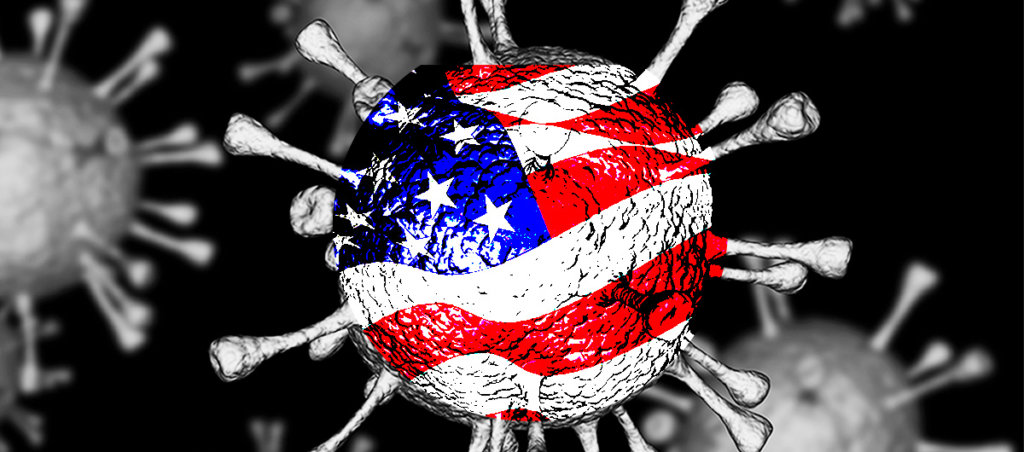The virus that has touched nearly every life on Earth isn't the culprit for the structural failures left in its wake. The cracks were already there.
This article was made possible because of the generous support of DAME members. We urgently need your help to keep publishing. Will you contribute just $5 a month to support our journalism?
At first glance, the accelerated unraveling of the United States seems to be the result of the novel coronavirus. It is the work of disease that has ravaged our healthcare system, inserted rising death tolls and job losses into our daily lives, and shredded our social fabric. Yet as the weeks have progressed and the costs have mounted, it has become increasingly clear that the coronavirus pandemic in this country is, at its core, neither a public health nightmare nor an economic cataclysm. It’s a crisis of politics.
After years of defining national politics by approval ratings, polling averages and partisan punditry, the reality of mass illness and death has eviscerated the empty optics to reveal a government in desperate disrepair at every level. The percentage of worldwide coronavirus deaths that are American betrays our failures. We have no coordinated healthcare system to trace the virus across state lines, map resource disparities, or manage mass purchase orders with protections against price gouging. We have no social insurance or government-guaranteed sick leave to protect the lives of the people at the core of our economy, those doing the physical labor of sustaining our society. We have no meaningful vision from the federal government: no offices dedicated to coordinating a national response, weighing regional needs, assigning focuses and goals. And even should any have existed, there would be no professionals to staff them.
Most tellingly: we have no social cohesion to bind American lives to each other, to remind us that individual sacrifice is as noble as individual achievement, to give us a sense that we really are in it together. Our country is torn instead between private sympathy for the desperate and deprived victims of the pandemic and its cascading effects and the public tacit support of armed protestors using the threat of violence to challenge the sovereignty of state governors’ stay-at-home orders. We have no shared responsibilities for the shared rights of government, only people who can afford to survive and those who must die for them to do so.
We have been reckoning with this reality in the form of absence: the equipment left unstocked; the preparations left undone; the lives unseen. There is a lack of empathy, too: there is no focus or concern from this government as the disease destroys vulnerable communities, and there is even less interest in ensuring the safety of these very same communities before attempting to reopen the economy. Perhaps the greatest gaps persist in our distribution of resources, like the hasty and sloppy relief bill that was not designed to forestall collapse so much as make air bubbles in the rubble. Coronavirus did not create or find the inequalities in our system; it merely thrived on them.
If politics is the art of the possible, then it is necessarily the art of power. Before the pandemic, our politics made the needs of eldercare and assisted living workers and their charges invisible, left even striking teachers and nurses unrecognized for the value of their labor, and rendered all issue-based coverage to a footnote in the last presidential campaign. Our politics produced the expectation of partisanship as the guiding principle of our elected officials rather than the dedication to the common good, allowing for corruption to reach the highest levels of our government with nary a consequence. Our politics has accepted the reality and repercussions of an unqualified, unscrupulous, intemperate buffoon running our country because nearly all the mechanisms of accountability — from elections to impeachment — have been undermined or eviscerated. The art of power in this country has abandoned its citizens in every aspect of our infrastructure, our shared understanding, and our leadership in the face of the challenges of a natural disaster. We were not prepared for this pandemic because we chose not to be.
We live in the echo of that politics and the people it has served: The wealthy who made strategic investments to profit from national distress; the manipulators and propagandists who created false security before the virus struck and deflected responsibility once it landed; the legislative caucus that has focused on shielding employers from the liability of compelling laborers to risk their lives while denying the deprived and unemployed millions enhanced unemployment insurance. The pandemic has not changed them; it has simply exposed them, and presented the rest of us with a new choice.
We cannot go back and undo the decades of national politics spent on the idea that what things seem to be is as important as what they are. We cannot even go back a few weeks and replicate the conditions that would allow us to contain the virus and its fallout. But we can reject replicating the misery and loss of the country as it is. We can choose a politics where the problems of the vulnerable are worth solving, where essential labor is rewarded with the essentials of stability, where our government is united in facing down a threat to all of its citizens rather than protecting the livelihoods of a few over the lives of the many. It is a politics where this crisis can never happen again.
